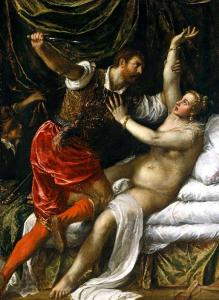
We are a mix of spiritual and material realities, each desiring and leading us to natures similar to themselves. Our spirit desires spiritual things, while our body desires material things. Nothing of this is bad. Our nature is good, and so the desires of the spirit and those of the body are good. But they must remain in a harmonious balance, never seeking and promoting one particular need over the expense of all others which we might have. We must not seek to be pure spirits apart from the body, nor to act and react merely as bodies without a spiritual principle lying behind them.
The desires of the flesh are in and of themselves good, given to us as a part of our good. [1] When we become imbalanced and focus on the desires of the flesh without any proper input from the spirit and its rationale, then they can lead us astray. The problem of the flesh is not the flesh, not the desires of the flesh, but the inordinate acceptance of such desires as being greater goods than they are. When there is no spiritual balance to help harmonize the desires of the flesh, the flesh will lead us unceasingly from desire to desire, each being satisfied momentarily before a similar desire comes once again upon us, leading us to act upon such desires without end. Our other needs will end up being neglected. We will not act with the wholeness of being which alone will give us a happy life. Thus, St. Catherine of Siena warned us:
Souls in deadly sin look to nothing but how they might find nourishment in the earth. Their appetite is insatiable, but they are never satisfied. They are insatiable and insupportable to their very selves.[2]
There is no satisfaction for those who seek after the goods of the flesh alone. Those who do so will find momentary pleasure but no sustaining peace or joy in their lives. They will have to act again and again to fulfill the desire of the flesh, and in doing so, they will likely find each act will satisfy less and less, making them having to do more and more to attain they pleasures which they seek. In this fashion, they risk becoming addicts to pleasure so that they can be said to be enslaved by the passion of the flesh, forever seeking to satisfy a master which will never be satisfied, as Hugh of St. Victor explained:
Finally, lust arrives, which forces the seduced mind to servitude. For after the flesh has been inflamed through overindulgence, the weakened and exhausted mind cannot vanquish the flame of sensuality that comes over it. [3]
It would be bad enough for us if we let ourselves be enslaved to a desire which is never satisfied: the harm will be to ourselves alone; but the one who leads their life in pursuit of such pleasure will ignore the dictates of justice, dictates which matter cannot declare, and so they will likely harm others trying to fulfill their desire: that is the true injustice of lust Is that it leads to desire from another, making them to be seen not as a good in and of themselves, but as a good to be used and abused to satisfy momentary desire.[4] It not only enslaves the one in the grips of lust, but it seeks to enslave others, spreading its contamination upon others. This is why not all desires of the flesh should be confused with lust, but only those which act contrary to justice and the good of all those involved. Likewise, this is why lust is intricately connected to other forms of injustice, such as greed, because the disposition it gives is the same: it, with greed and vainglory, makes a person forget the good which they once had, ignorant of the good which they should have, and therefore slothful as they see no need to fight against their passion.[5] In this fashion, we read in Proverbs the warning that riches will not help those who act unjustly towards others when injustices are judged:
Riches do not profit in the day of wrath, but righteousness delivers from death. The righteousness of the blameless keeps his way straight, but the wicked falls by his own wickedness. The righteousness of the upright delivers them, but the treacherous are taken captive by their lust. When the wicked dies, his hope perishes, and the expectation of the godless comes to nought (Prov. 11:4-4 RSV).
The hopes of the flesh, the hopes of those who live bound to mere worldly desires, be they riches or the pleasures of the flesh, remain bound to the limitations of the world. Such satisfaction is temporary, even in life; but in death, all that has been gained, all that remained with us, will be gone. Without true riches, without true justice bound to love, principles which transcend the material realm, we have nothing; but with them, we have hope because in and through justice and love we have something which transcends the transient nature of material being. It is with them and in them that our material being can flourish and receive its proper good; with them, we can find true satisfaction:
For those who live according to the flesh set their minds on the things of the flesh, but those who live according to the Spirit set their minds on the things of the Spirit. To set the mind on the flesh is death, but to set the mind on the Spirit is life and peace (Rom. 8:5-6 RSV).
Paul did not denounce material creation and the good within it; he did not deny the good of the flesh itself, but rather, the inordinate, fallen mode of being where the flesh and its desires are followed without spiritual direction. The material world is transitory and all that is in it will perish: to live in the flesh apart from the spirit is to live in and with that death. To thrive in the spirit is to live in the kingdom of God and its eternal glory, even in the flesh. When we truly harmonize our body and spirit and allow the spiritual principles to rationally direct and guide us, we will be able to act and judge in righteousness, to consider our actions in ways beyond the moment which passes away.
We have, in our fallen mode of being, become focused upon fulfilling our desires of the moment, upon the appetites of the flesh. Christ came to heal us from that imbalance. The desires of the flesh need to be transformed, not denied, so that they can form a part of the integral whole that we should be. Thus, St. Maximos the Confessor explained, it is with our appetites, with our desires, that we shall first seek healing:
The soul is tripartite and considered as having three powers: the intelligent, the incensive, and the appetitive. Because the soul was ill in all three powers, Christ, the soul’s Healer, began His cure with the last, the appetitive. For desire unsatisfied fuels the incentive power, and when both the appetitive and incensive powers are sic, they produce distraction of mind. Thus the soul’s incensive power will never be healthy before the appetitive power is healed; nor will the intelligence be healthy until the other two powers are first restored to health.[6]
The desires of the flesh, the desires given to us by nature are good, but they need their proper end, their proper fulfillment. When we allow ourselves to integrate our body and spirit together, when we let reason and the dictates of justice moderate our actions, we will find a wholeness of being which gives us greater satisfaction and peace than what the desires of the flesh alone can give.
[1] “Even if we make bad use of these passions, nature itself is not therefore sinful, nor should we blame the Creator. A man who gives someone a knife for some necessary and useful purpose is not to blame if the person uses it to commit murder, “ St. John Cassian, “On the Eight Vices,” in in The Philokalia: The Complete Text. Volume One. Trans. G.E.H. Palmer, Philip Sherrard, Kallistos Ware et. al. (London: Faber and Faber, 1983), 78.
[2] St. Catherine of Siena, The Dialogue. Trans. Suzanne Noffke, OP (New York: Paulist Press, 1980), 173.
[3] Hugh of St. Victor, “On the Five Sevens” in Writings on the Spiritual Life. A Selection of Works of Hugh, Adam, Achard, Richard, Walter, and Godfrey of St. Victor. Trans.Joshua C. Benson. Ed. Christopher P. Evans (Hyde Park, NY: New City Press, 2014), 259-60. Similarly, Richard of St. Victor said: “The damage of our defect is the place from which it flows out; pleasure (oblectamentum) is the place on which it flows down; disgust is the place to which it flows; and desire (desiderium) is he place on which it flows back. After much disgust at its satiety every appetite reverts back to its own place out of a great desire of its lust. This happens so that that appetite may flow out once again because the same necessity as before urges it to return to its gratifying pleasures in order to restore its bodily damages,” Richard of St. Victor, “On the State of the Interior Man,” in Writings on the Spiritual Life. A Selection of Works of Hugh, Adam, Achard, Richard, Walter, and Godfrey of St. Victor. Trans. Christopher P. Evans (Hyde Park, NY: New City Press, 2014), 259-60.
[4] Often, those who are used in this manner are often forced to accept such abuse, either by the power and authority of the one who abuses them, or because the one who abuses them gives them something which they need in exchange for being used. True charity and justice would not create the situations for such abuse to exist: that is, there would be no one finding themselves in need who will be forced to sell themselves off to others just to survive.
[5] Thus, St. John of Damascus explained: “The roots or primary causes of all these passions are love of sensual pleasure, love of praise and love of material wealth. Every evil has its origin in these. As Mark, the wisest of ascetics, says, a man cannot commit a single sin unless the three powerful giants, forgetfulness, laziness and ignorance, first overpower him and enslave him. And these giants are the offspring of sensual pleasure, luxury, love of men’s esteem and distraction,” St. John of Damaskos, “On the Virtues and Vices” in The Philokalia: The Complete Text. Volume Two. Trans. G.E.H. Palmer, Philip Sherrard, Kallistos Ware et. al. (London: Faber and Faber, 1990), 335-6.
[6] St. Gregory Palamas, “Letter to the Most Reverend Nun Xenia” in The Philokalia: The Complete Text. Volume Four. Trans. G.E.H. Palmer, Philip Sherrard, Kallistos Ware et. al. (London: Faber and Faber, 1995), 304.
Stay in touch! Like A Little Bit of Nothing on Facebook
















